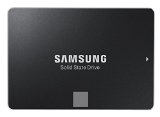Samsung 850 EVO 1TB 2.5-Inch SATA III Internal SSD (MZ-75E1T0B/AM)
- Optimized performance for everyday computing needs
- Sequential read speed 550 MB/s; Sequential write speed 520 MB/s; Random read speed 100K; Random write speed 90K
- Energy efficient – improves battery life by up to 50 minutes vs. hard disk drives
- Worry-free data security with AES 256-bit, TCG/Opal v.2 and Microsoft eDrive full-disk encryption
- Backed by a five-year limited warranty
- Capacity: 1TB
- Form Factor: 2.5 inch
- Interface: SATA 6Gb/s (Compatible with SATA 3Gb/s & SATA 1.5Gb/s)
- NAND Flash: 32 Layer 3D V-NAND
- Thickness: 7.0 mm
Upgrading your PC with a Samsung SSD is the most economical way to breathe new life into an aging PC. The 850 EVO reads, writes and multi-tasks at incredible speeds, enhancing boot-up speed, application loading and multi-tasking performance. It’s more than an upgrade, it’s a complete transformation of your PC.
List Price: $ 499.99
Price: [wpramaprice asin=”B00OBRFFAS”]
[wpramareviews asin=”B00OBRFFAS”]





Replacement of laptop HDD was very easy and nice performance improvement!,
I was worried that the process to copy all data from original disk to new would be complicated, but luckily it was a breeze!! This SSD comes with a CD containing the migration software and Magician (for performance improvements). If you don’t have an optical drive on your laptop, like me, you’ll need to find another PC to copy the installation software to a USB drive or upload somewhere to the internet. I didn’t find the migration software on Samsung website. EDIT: Gohanrocs12 comment provided where to find the migration software on Samsung website: http://www.samsung.com/samsungssd. Thanks, Gohanrocs12!
I also bought an external case from Amazon (http://www.amazon.com/gp/product/B00H98AXOE/ref=oh_aui_detailpage_o04_s00?ie=UTF8&psc=1). It was used initially with the SSD to migrate the data and now I use it with the HDD that was originally in my laptop.
The migration software was really easy to use. I just picked the 2 existing partitions from original 1TB HDD and it set the two partitions on the 250GB SSD. I was able to readjust the size of the partitions and then it started the copying process. It took a few minutes to copy around 60GB of data. I believe under 10min,
After it was finished I just removed old drive, installed the new one and everything was working. Didn’t have any problems booting Windows 8 or anything else.
I then ran the Magician software and asked to optimize disk for Performance and enabled the RAPID feature. I was running the Magician performance tests and they significantly improved after enabling RAPID.
Now everything loads blazing fast and I’m very happy with my laptop and this SSD.
UPDATE 19-mar-2015: There were some questions about ability of the migration software to copy the factory recovery partition to the SSD. Gohanrocs12 clarified it. Here is his comment:
“…Limitations of the software:
6. OEM recoverypartitions, generated at the factory by computer manufacturers, cannot be replicated”
As another customer noted in the comments, it may be a good idea to keep the original HDD around just in case you need to recover from disaster.
0
Was this review helpful to you?

|
I would recommend running a read/write speed test using an app like …,
0
Was this review helpful to you?

|
Excellent Regardless of Configuration: Single, RAID 0, RAID 1, RAID 10 – Comparable to 840 EVO 120GB, 250GB and 850 EVO 120GB,
To condense the following review, there is no absolute performance leader between the Samsung 850 EVO 120GB and 850 EVO 250GB relative to the Samsung 840 EVO 120GB and 840 EVO 250GB. The determining factors in the selection process and in particular to SSD RAID arrays, being the desired drive configuration and task assigned.
The Samsung 850 EVO 250GB SSD, regardless of the 6G (SATA III) configuration being tested, provides excellent performance; single, RAID 0, RAID 1, RAID 10. Variations in data transfer rate between four drives, much like that produced by the Samsung 840 EVO 120GB and 850 EVO 120GB being minimal. A set of four 850 EVO 120GB having the greatest measured performance span within a single group, the small file size (4K file) scores ranging from (151.2 – 153.6MB/s write, 171.1 – 176.3MB/s read) the large file size (8192K) spanning a ranging of (436.9 – 442.1MB/s write, 504.1 – 510.1MB/s read).
Peak read performance (1024K file) for a single 850 EVO 250GB drive being 537MB/s. The 840 EVO 120GB and 840 EVO 250GB, given identical platform and conditions scoring lower at 516MB/s and 513MB/s (1024K file) respectfully, with a peak recorded value of 521MB/s (128K and 256K file) and 522MB/s (512K and 8192K file). The 850 EVO 120GB drive producing a peak read score similar to the 840 EVO’s, with a value of 515MB/s (2048K and 4096K file).
Everyday performance (4K file) of a single 850 EVO 250GB drive coming in at a very nice (170MB/s write, 189MB/s read). The score passing the 840 EVO 120GB and 840 EVO 250GB, which produced in order, (154MB/s write, 168MB/s read) and (126MB/s write, 141MB/s read). The 850 EVO 120GB drive being third best in the group with a score of 153MB/s write, 176MB/s read.
When configured as a 240GB (x2, 850 EVO 120GB) RAID 0 array, the Samsung 850 EVO 120GB produced better small (4K) file scores of 122MB/s write, 136MB/s read compared to the 850 EVO 250GB configured as a 500GB (x2, 850 EVO 250GB) RAID 0 array, resulting in scores of 111MB/s write, 126MB/s read.
Notable in the results and unlike traditional hard drive RAID 1 arrays, the Samsung solid state drives, when configured as a RAID 1 for files greater than 4K in size, experiencing little performance degradation during the write cycle.
Another interesting result, when configured as a 120GB (x2, 850 EVO 120GB) RAID 1 array, the Samsung 850 EVO 120GB again produced better small (4K) file write score with a value of 112MB/s compared to the 850 EVO 250GB configured as a 250GB (x2, 850 EVO 250GB) RAID 1 array, producing a score of 85.9MB/s and slightly more than 30% slower than the 850 EVO 120GB.
The peak read performance (8192K file) when configured as a RAID 10, 500GB (x4, 850 EVO 250GB) drive being in excess of 1.60GB/s. The score being slightly more than that produced by a 240GB (x4, 840 EVO 120GB) RAID 10 array transferring the same file, measuring 1.52GB/s with a peak read score of 1.64GB/s (4096K file), besting the highest read score produced by the 850 EVO 250GB. The 840 EVO 120GB, 240GB array also generating superior write results at 95.4MB/s (4K file) compared to the 850 EVO 250GB, 500GB array which produced a maximum write value of 79.8MB/s (4K file) and 16% differential.
The 850 EVO 120GB configured as a 240GB (x4, 850 EVO 240GB) RAID 10 array producing better small (4K) file performance with a score of 98.1MB/s write, 132MB/s read, compared to the 850 EVO 250GB at 79.8MB/s write, 122MB/s read. The 850 EVO 120GB resulting in the lowest RAID 10 peak read value in the group with a score (2048K, 4096K, 8192K files) of 1.49GB/s.
*When configured with an Areca 12G SAS RAID controller rather than an IBM 6G SAS RAID controller, the data transfer rate for small file (4K) sizes improved by nearly 250%, a 240GB (x4, 850 EVO 120GB) RAID 10 array reaching 460.0MB/s write, 483.9MB/s read and shared in the addendum below (29 Dec 2014).
The 850 EVO 120GB and 850 EVO 250GB configurations tested, using Win7 Ultimate 64 and Atto Disk Benchmark 2.47, scored as follows:
Single, 120GB drive (x1, 850 EVO 120GB):
(4K file) 153MB/s write – 176MB/s read
(128K file) 472MB/s write – 511MB/s read
(1024K file) 450MB/s write – 513MB/s read
(8192K file) 442MB/s write – 510MB/s read
Single, 250GB drive (x1, 850 EVO 250GB):
(4K file) 170MB/s write – 189MB/s read
(128K file) 506MB/s write – 541MB/s read
(1024K file) 476MB/s write – 537MB/s read
(8192K file) 474MB/s write – 534MB/s read
——————————————
RAID 0, 240GB drive (x2, 850 EVO 120GB):
(4K file) 122MB/s write – 137MB/s read
(128K file) 933MB/s write – 1040MB/s read
(1024K file) 907MB/s write – 1028MB/s read
(8192K file) 884MB/s write – 1027MB/s read
RAID 0, 500GB drive (x2, 850 EVO 250GB):
(4K file) 111MB/s write -…
Read more
Was this review helpful to you?

|